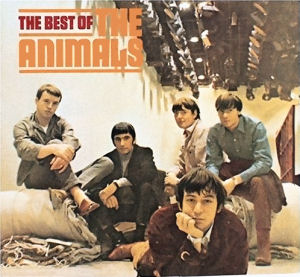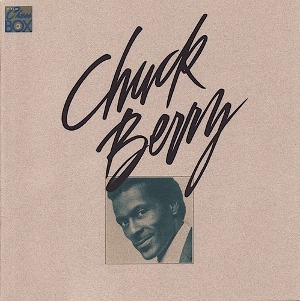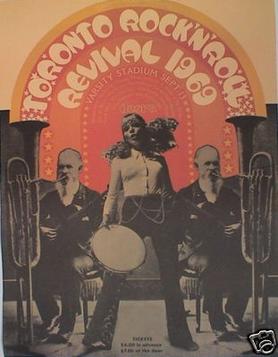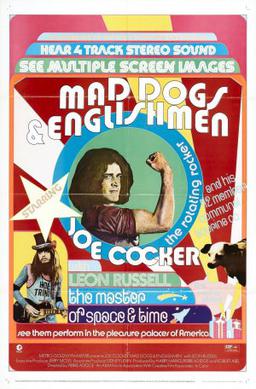
Ellas Otha Bates, known professionally as Bo Diddley, was an American guitarist and singer who played a key role in the transition from the blues to rock and roll. He influenced many artists, including Buddy Holly, Elvis Presley, the Beatles, the Rolling Stones, the Animals, George Thorogood, Syd Barrett, and the Clash.
Rock and roll is a genre of popular music that evolved in the United States during the late 1940s and early 1950s. It originated from African American music such as jazz, rhythm and blues, boogie-woogie, electric blues, gospel, jump blues, as well as country music. While rock and roll's formative elements can be heard in blues records from the 1920s and in country records of the 1930s, the genre did not acquire its name until 1954.

Charles Edward Anderson Berry was an American singer, guitarist and songwriter who pioneered rock and roll. Nicknamed the "Father of Rock and Roll", he refined and developed rhythm and blues into the major elements that made rock and roll distinctive with songs such as "Maybellene" (1955), "Roll Over Beethoven" (1956), "Rock and Roll Music" (1957), and "Johnny B. Goode" (1958). Writing lyrics that focused on teen life and consumerism, and developing a music style that included guitar solos and showmanship, Berry was a major influence on subsequent rock music.

Sha Na Na was an American rock and roll and doo-wop revival group formed in 1969. The group performed a song-and-dance repertoire based on 1950s hit songs that both revived and parodied the music and the New York City street culture of the 1950s. After gaining initial fame for their performance at the Woodstock Music and Art Fair, made possible with help from their friend Jimi Hendrix, the group hosted Sha Na Na, a syndicated variety series that ran from 1977 to 1981.
The London Rock and Roll Show was a concert held at Wembley Stadium in Wembley Park, London, England, on 5 August 1972. It is often said to have been the first ever concert held at the stadium, but a pop concert featuring the bands Status Quo and Yes had been held as part of the Oxfam Walk 1969 charity event at the stadium on 13 July 1969.
The rock and roll revival was a back-to-basics musical trend of the late 1960s and early 1970s, in a sort-of backlash against the heavier and psychedelic rock sounds then in vogue.
Sweet Toronto is a documentary by D.A. Pennebaker of the Toronto Rock and Roll Revival, a one-day festival held September 13, 1969, at Varsity Stadium on the campus of the University of Toronto and attended by some 20,000 people. The event was produced by John Brower and Ken Walker. John Lennon, who seven days later would unofficially resign as a member of the Beatles, played as part of the Plastic Ono Band, whose members also included Yoko Ono, Klaus Voormann, Alan White, and Eric Clapton. Their set was released as the album Live Peace in Toronto 1969.

The Best of The Animals is the first greatest hits collection by the British rock group the Animals. MGM Records released the album in February 1966 in the United States. It showcases the Animals' tough-edged pop hits combined with their more devoted blues and R&B workouts. The album has been reissued with some different tracks and a similar collection, The Most of Animals, was released in the United Kingdom in 1966.
Bob Baldori, also known as "Boogie Bob", is an American rock, blues, boogie musician and attorney. He plays the guitar, harmonica and piano.
Philip Chess was a Polish-born American record producer and company executive, the co-founder with his brother of Chess Records.

Hail! Hail! Rock 'n' Roll is a 1987 American documentary film directed by Taylor Hackford that chronicles two 1986 concerts celebrating rock and roll musician Chuck Berry's 60th birthday. A soundtrack album was released in October 1987 on the MCA label. The name comes from a line in Berry's song "School Days".

Lafayette Leake was an American blues and jazz pianist, organist, vocalist and composer who played for Chess Records as a session musician, and as a member of the Big Three Trio, during the formative years of Chicago blues. He played piano on many of Chuck Berry's recordings.

The London Rock and Roll Show is a 1973 British-produced concert film directed by Peter Clifton chronicling a Rock and Roll Revival concert held at Wembley Stadium in London, England in August 1972.

The Chess Box is a compact disc box set compilation by Chuck Berry. It is one in a series of box sets issued by MCA/Chess in the late 1980s. The Chuck Berry set is the most prominent of these, having won a Grammy Award for Best Historical Album in 1989. Berry's Chess Box was reissued on vinyl in 1990.

Who Do You Love? is a 2008 film biopic of American record producer Leonard Chess (1917–1969). It was directed by Jerry Zaks and written by Peter Martin Wortmann and Robert Conte, and stars Alessandro Nivola as Chess. The cast also includes David Oyelowo as Muddy Waters.

The Toronto Rock and Roll Revival was a one-day, twelve-hour music festival held in Toronto, Ontario, Canada on September 13, 1969. It featured a number of popular musical acts from the 1950s and 1960s. The festival is particularly notable as featuring an appearance by John Lennon, Yoko Ono, and Eric Clapton as the Plastic Ono Band, which resulted in the release of their Live Peace in Toronto 1969 album. The festival was also the subject of two films: D.A. Pennebaker film Sweet Toronto and the 2022 Ron Chapman film Revival 69: The Concert That Rocked the World.

Keep on Rockin', aka Little Richard: Keep on Rockin is a film of a 1969 Little Richard concert at the Toronto Rock and Roll Revival festival originally released in 1970. The film is in colour.
Robert L. Comstock was an American rock and roll and pop singer and musician who had success in the late 1950s and early 1960s both as a solo singer and as a member of Bobby Comstock and the Counts. His biggest hits were a version of "Tennessee Waltz" in 1959, and "Let's Stomp" in 1963.

Mad Dogs & Englishmen is a 1971 American documentary film of Joe Cocker's 1970 U.S. tour, directed by Pierre Adidge, starring Cocker and Leon Russell. The film was released on March 29, 1971, by Metro-Goldwyn-Mayer.
Richard Nader (1940–2009) was a disk jockey and the entertainment promoter who pushed the concept of oldies mainstream, beginning with his first Rock and Roll Revival concert October 18, 1969, featuring Chuck Berry, The Platters, Bill Haley and the Comets, The Shirelles, The Coasters, Jimmy Clanton, and Sha Na Na.












